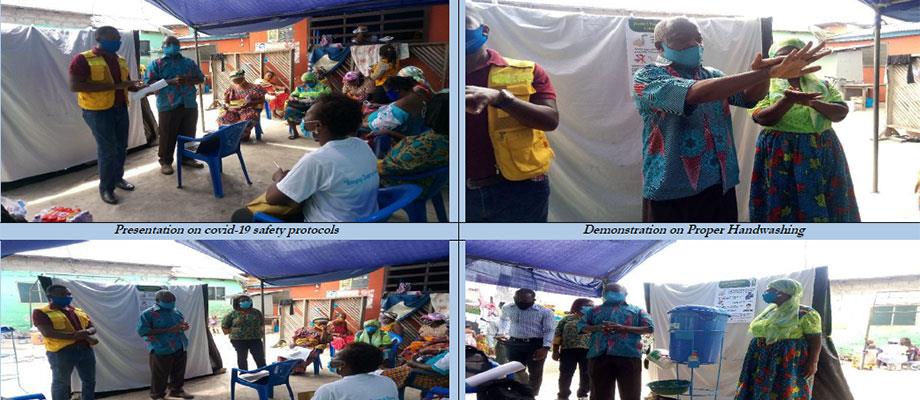COVID-19 sensitization for NAFPTA executives in coastal regions of Ghana

As part of Norad’s commitment to empowering women in small-scale fisheries for sustainable food systems, resources were immediately made available to combat the onset of Covid-19 in Ghana, Uganda, Malawi, Sierra Leone and Tanzania. Emergency action plans were drawn up to raise awareness of the risks posed by Covid-19 and preventative measures fishers and fishworkers could adopt to prevent contraction and the spread of the virus.
 Scenes from Covid-19 sensitization exercise at Chorkor ©FAO-Ghana |
Over the course of two weeks in July, FAO collaborated with the Ghana Fisheries Commission to sensitize fishers and fishworkers on Covid-19 mitigation in twelve fishing communities in four coastal regions of Ghana. The target audience were executives from the National Fishworkers and Traders Association of Ghana (NAFPTA) with the expectation that the executives would then disseminate this knowledge among their members. A total of 529 (made up of 491 women and 38 men) attendees participated in the exercise.
The sensitization exercises consisted of a presentation delivered by Mr Samuel Manu, Head of Post-Harvest Operations in the Ghana Fisheries Commission. He addressed the causes and origins of Covid-19, how it is transmitted from one person to another, signs and symptoms of the infection, the rationale behind isolation and quarantine and preventive measures. These safety protocols include (i) appropriate washing of hands, (ii) appropriate wearing of face mask, (iii) not touching the mouth, eyes and nose, (iv) use and appropriate disposal of tissue papers during coughing, and (v) practicing social distancing.
Importantly, the presentation included a Q&A session that allowed fishers and fishworkers to clarify safety protocols. It is acknowledged that the context in which fishing communities are set does not always lend itself to Covid-19 protocols, and it is important to recognise this gap between policy and applicability. Many were concerned for their children, to which the Ghanaian Fisheries Commission prudently advised to avoid sending children to crowded places and keeping from potentially risk-prone areas. Additionally, though there was a general awareness of the virus and its origins, many people were sceptical of its spread to Ghana. Therefore, there was a need for the government to intensify public education and sensitization on the dangers of the virus and the need to adhere to approved safety protocols to minimize the spread.
Aside from the presentation and discussion, the Ghana Fisheries Commission participants were also taken through a 10-step procedure for washing hands in order to continue handling fishing in a hygienic way. This was complemented with the donation of handwashing apparatuses comprising of veronica buckets, metal stands, washing bowls, plastic baskets, tissue papers, liquid soap and sanitizers and were entreated to use it at every meeting held by the association.
